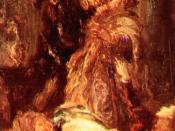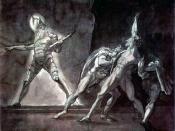Rage and Justice From the very beginning of Shakespeare's Hamlet, the title character feels anger over his mother's quick transition from mourning her dead husband to marrying his brother. In Hamlet's first soliloquy, he berates the hasty marriage, crying "a beast, that wants discourse of reason, would have mourned longer." When the ghost of his father issues demands that Hamlet avenge his murder, Hamlet's pre-existing anger overwhelms this sacred mission, corrupting it and ultimately rendering it an act of angry indulgence.
Hamlet's generally dry, melancholic demeanor blunts the rational, just nature of his vengeance. Seeing the player in act two so impassioned in his oration on Hecuba, Hamlet realizes that he is not properly incensed over the pernicious actions of his uncle. He resolves to forget his cause no longer and hatches a plot to test Claudius's guilt through a dramatic presentation of murder. However, that Hamlet feels the need for such a test further indicates the lack of impetus from his mission's righteousness alone.
Hamlet's introspective and skeptical character leads him to question the validity of the ghost's charge, and even the trustworthiness of the ghost itself. Even after Claudius reveals his guilt, justice lacks sufficient force to motivate Hamlet. When he finds Claudius alone in his room, hamlet realizes he has his chance, yet he stops himself. For Hamlet, the justice of sending Claudius to be judged by his maker is not enough; rather, he desires the ultimate punishment for Claudius--eternal torture in hell--resolving to forestall until "he is drunk asleep, or in a rage, or in th'incestuous pleasure of his bed...Then to trip him, that his heels may kick at heaven, and that his soul may be as damn'd and black as hell, whereto it goes." Hamlet reveals that the true driving force of his vengeance to be his anger for Gerturde's inadequate mourning and for Claudius's seeming seduction of her. Hamlet reveals this anger both in his desire for Claudius's extreme punishment and in the rage later directed at Gertrude. He calls her deeds "such an act that blurs the grace and blush of modesty, [that] calls virtue hypocrite." Indeed, he quells his rage only upon the entrance of the ghost, who re-entreats Hamlet to his mission, reminding him of his supposedly just purpose. Periodically throughout the play, Hamlet's smoldering erupts, as in act three when he declares "'Tis now the very witching time of night...now could I drink hot blood, and do such bitterness as the day would quake to look on." These contradictory currents reveal Hamlet's dilemma. Whenever his passion burns so that he feels on the brink of rash action, his rational nature catches him, yet the rational justification of his revenge is not enough to impel him to action. Perhaps Hamlet's most revealing action is his complement of Horatio: "Thou hast been...a man that fortune's buffets and rewards has ta'en with equal thanks: and blest are those whose blood and judgment are so well commenddled...Give me that man that is not passion's slave, and I will wear him in my heart's core." Hamlet reveals his awareness of his own tragic flaw: that while his will is not strong enough to impel him to fulfill his vengeance, it is strong enough to arrest the full action of his passion. Similarly, he justifies vengeance in the sacred charge of his disembodied father, while it truly is the whim of his spleen.





